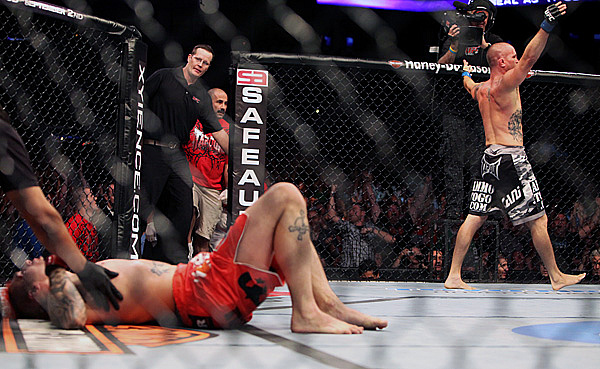One Man’s View: Graceful Exits Not the Norm

Chris Lytle’s exit was as good as it gets. | Photo: AP
Photo/Jeff Sainlar/Journal Sentinel
He never got to challenge for a UFC belt, but Chris Lytle won a rarified title on Sunday at UFC Live 5: that of a long-time competitor exiting the game on a high note, on his own terms and with a perfect ending, to boot.
Lytle’s third-round submission of Dan Hardy at the Bradley Center in Milwaukee was as good as it gets in terms of writing the final chapter to a career. Over the next decade, we will see plenty of name fighters retire, but few if any will match the perfect closure of Lytle’s last dance -- assuming he makes it stick, and I think he will. That is because fighters are, by their nature, wired to compete, regardless of what the critics would recommend.
Advertisement
As a guy’s skills dwindle, with mileage from years of training and competing piling up, the promotion is faced with a grim set of choices: turn him into a steppingstone or release him onto the free market, where either a legitimate competitor or an upstart can snap him up and cash in on his marketability.
The latter option is mainly the case in the marketplace these days,
and adding a big-name star is barely a blip on the radar because
MMA is largely a one-horse race, with the UFC free and clear of
past rivals. Whether it was real ones, such as Strikeforce,
or potential big-spending threats to market share, such as EliteXC and
Affliction,
the UFC was incentivized to keep its most prominent names on the
payroll, even if it served to overpay some of them.
However, in a one-player race -- with Bellator Fighting Championships running a distant second -- will those changes to the business environment result in releasing top fighters that simply cannot perform at a reasonable level? It is certainly a far more viable option now -- with the UFC’s brand presence expanding across all major mediums: pay-per-view, free TV and the Internet via Facebook prelims and online pay offerings -- then when potential competitors existed, running amok by signing anything and anyone they could to build a stable.
Chuck
Liddell File Photo
Liddell is a happy exception.
Over a long enough timeline, it is going to become inevitable for everyone, including the likes of Anderson Silva and Georges St. Pierre.
For fighters -- particularly those at the elite level who were once champions or top contenders -- ending a career is never an easy move. The reality of what most us think we already know is what makes defying that reality such an intriguing feat. Randy Couture is a perfect example. Coming out of retirement to best Tim Sylvia because the division’s heavyweights lacked competitive fire, Couture bought himself a new lease on his career because he was correct. Such circumstances are hardly likely to recur in the game today, with its huge growth, increasing depth and better athletes entering the fray at a staggering rate.
When Chuck Liddell retired last year after losing three fights in a row by brutal knockout, “The Iceman” had about as good a landing as one could imagine, as he was hired on by UFC parent company Zuffa LLC. Liddell is a happy exception, and it seems highly doubtful the company could be so generous for every retiring star, because there are going to be a lot of them in the next two to four years.
The process of how to gently muster an athlete out of the promotion carries its own risks. Put him in for one too many one-sided losses, and his presence starts to resemble a maudlin sideshow. A fighter can only give retirement speeches and then come back so many times with diminishing returns before the whole scene stops resembling sport and becomes spectacle.
That is why Lytle’s win over Hardy was so stirring. He came into the UFC as an unheralded competitor, often as the B-side to bigger-name fighters, and left at the time of his choosing, with a definitive win closing the show.
Jason Probst can be reached at Jason@jasonprobst.com or twitter.com/jasonprobst.
Related Articles







